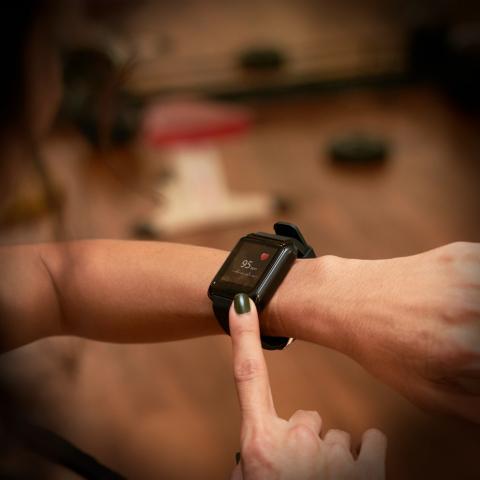
A group of Penn State researchers is developing a system — WearIT — utilizing wearable devices as tools to help individuals battle addiction.
Their idea was the winner of Ben Franklin Technology Partners of Central and Northern Pennsylvania’s TechCelerator program, receiving $10,000 in December to bring the idea closer to market.
WearIT is a scientific framework that uses a wearable device — such as a Fitbit or Apple watch — along with a smartphone and a web server to detect indicators of stress and/or anxiety in the person wearing the device.
When detected, the device would offer feedback in the moment to keep the user focused on recovery. Methods depend on the user’s preferences, what the system has learned over time about how the user prefers feedback, requirements of a recovery program, and other factors.
It was created by Timothy Brick and Zita Oravecz, assistant professors of human development and family studies and co-principal investigators; and James Mundie, a mobile app developer at Penn State.
“The real goal of WearIT is to help people recovering from addiction to not just survive without the object of their addiction, but to thrive. The Wear-IT technology aims to help by detecting when a person is having cravings and offering in-the-moment intervention strategies to the patient as well as collecting additional data to provide to others involved in the patient’s recovery,” Brick said.
These intervention strategies could include a breathing exercise or a quick game, Mundie said.
“At another level, users could be asked if they want to contact their sponsors, or see a picture of their children,” Mundie said.
The device collects data such as heart rate measurements; freeform text entry; mobile data such as GPS location, time of day, temperature, movement and sleep; and multimedia such as images and video.
“Just as a user can be prompted to enter freeform text thoughts or take a multiple-choice survey, they can also be presented with the option to take a picture or short video with the camera in the smartphone, or even record a short snippet of audio with the microphone,” Mundie said.
In addition to providing in-the-moment interventions, WearIT can also provide summarized reports to share with the patient’s counselor, sponsor, spouse or parent in order to help them better understand the individual factors in the patients’ addiction — and recovery.
“We can also provide a place to keep track of details of the patient’s recovery effort, such as times and locations of Alcoholics Anonymous or Narcotics Anonymous meetings, reminders, and goal setting,” Oravecz said.
WearIT would also offer a subscription-based reporting service to rehabilitation centers for use with their patients.
The $10,000 award from the TechCelerator allows the group to escalate the next steps of creating a company, including continued development of the product; creating a business plan; developing an efficacy study with a rehabilitation center; hiring a CEO; and seeking investors.
The team hopes to launch its product and company in summer 2018.
Funding for the research behind and proposal for WearIT came from the College of Health and Human Development Discovery to Innovation (D2I) Grant Program and Penn State’s Fund for Innovation, sponsored by the Penn State Research Foundation.
TechCelerator is a partnership among several of the area’s economic development providers that offers budding entrepreneurs designated space, loan and investment programs, business support and mentoring services, and entrepreneurial training. For more information, visit www.techceleratorstatecollege.org.